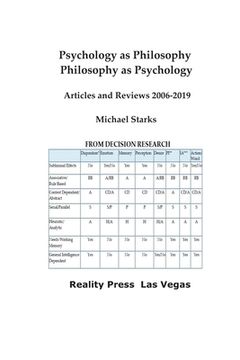Psychology as Philosophy, Philosophy as Psychology: Articles and Reviews 2006-2019 (en Inglés)
Reseña del libro "Psychology as Philosophy, Philosophy as Psychology: Articles and Reviews 2006-2019 (en Inglés)"
Since philosophical problems are the result of our innate psychology, or as Wittgenstein put it, due to the lack of perspicuity of language, they run throughout human discourse and behavior, so there is endless need for philosophical analysis, not only in the 'human sciences' of philosophy, sociology, anthropology, political science, psychology, history, literature, religion, etc., but in the 'hard sciences' of physics, mathematics, and biology. It is universal to mix the language game questions with the real scientific ones as to what the empirical facts are. Scientism is ever-present and Wittgenstein, arguably the greatest intuitive psychologist of all time, has laid it before us long ago, beginning with the Blue and Brown Books in the early 1930's.Language is programmed in our genes and is involved in nearly all our social behavior. Philosophy in the strict sense (i.e., academic philosophy), is as Wittgenstein showed us, the study of the way language is used (language games) and I regard it as the descriptive psychology of higher order thought (i.e., pretty much everything involving language which is often called System 2 or slow thinking). However, as I hope I have shown in my writings over the last decade, nonlinguistic behavior or System 1 or fast thinking is also described with language and this leads to endless confusion which I have tried to clarify here and which is summarized in the tables that I present. It is my contention that the table of intentionality (rationality, mind, thought, language, personality etc.) that features prominently here describes more or less accurately, or at least serves as an heuristic for, how we think and behave, and so it encompasses not merely philosophy and psychology, but everything else (history, literature, mathematics, politics etc.). Note especially that intentionality and rationality as I (along with Searle, Wittgenstein and others) view it, includes both conscious deliberative linguistic System 2 and unconscious automated prelinguistic System 1 actions or reflexes.I provide a critical survey of some of the major findings of two of the most eminent students of behavior of modern times, Ludwig Wittgenstein and John Searle, on the logical structure of intentionality (mind, language, behavior), taking as my starting point Wittgenstein's fundamental discovery -that all truly 'philosophical' problems are the same-confusions about how to use language in a particular context, and so all solutions are the same-looking at how language can be used in the context at issue so that its truth conditions (Conditions of Satisfaction or COS) are clear. The basic problem is that one can say anything, but one cannot mean (state clear COS for) any arbitrary utterance and meaning is only possible in a very specific context. I analyze various writings by and about them from the modern perspective of the two systems of thought (popularized as 'thinking fast, thinking slow'), employing a new table of intentionality and new dual systems nomenclature. I show that this is a powerful heuristic for describing behavior with critical reviews of the writings of a wide variety of behavioral scientists (i.e., everyone).The first group of articles attempt to give some insight into how we behave that is reasonably free of theoretical delusions. In the next three groups I comment on three of the principal delusions preventing a sustainable world- technology, religion and politics (cooperative groups). People believe that society can be saved by them, so I provide some suggestions in the rest of the book as to why this is unlikely via short articles and reviews of recent books by well-known writers.

